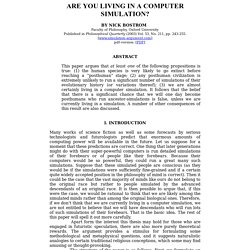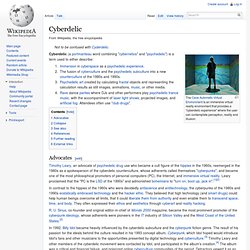

Future of Humanity Institute - Future of Humanity Institute. The Simulation Hypothesis. Are You Living in a Simulation? Many works of science fiction as well as some forecasts by serious technologists and futurologists predict that enormous amounts of computing power will be available in the future.

Let us suppose for a moment that these predictions are correct. One thing that later generations might do with their super-powerful computers is run detailed simulations of their forebears or of people like their forebears. Because their computers would be so powerful, they could run a great many such simulations. Suppose that these simulated people are conscious (as they would be if the simulations were sufficiently fine-grained and if a certain quite widely accepted position in the philosophy of mind is correct).
Then it could be the case that the vast majority of minds like ours do not belong to the original race but rather to people simulated by the advanced descendants of an original race. 20 predictions for the next 25 years. 1 Geopolitics: 'Rivals will take greater risks against the US' No balance of power lasts forever.

Just a century ago, London was the centre of the world. Britain bestrode the world like a colossus and only those with strong nerves (or weak judgment) dared challenge the Pax Britannica. That, of course, is all history, but the Pax Americana that has taken shape since 1989 is just as vulnerable to historical change. Cyberdelic. The Cave Automatic Virtual Environment is an immersive virtual reality environment that provides a "cyberdelic experience" where the user can contemplate perception, reality and illusion.

Cyberdelic (a portmanteau word combining "cybernetics" and "psychedelic") is a term used to either describe: Advocates[edit] Timothy Leary, an advocate of psychedelic drug use who became a cult figure of the hippies in the 1960s, reemerged in the 1980s as a spokesperson of the cyberdelic counterculture, whose adherents called themselves "cyberpunks", and became one of the most philosophical promoters of personal computers (PC), the Internet, and immersive virtual reality.